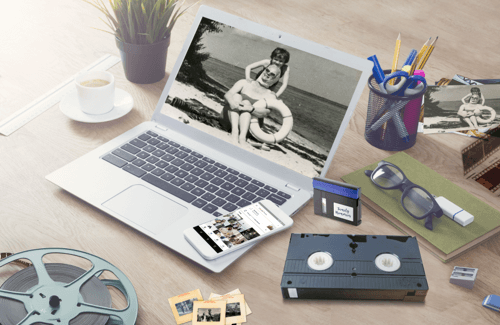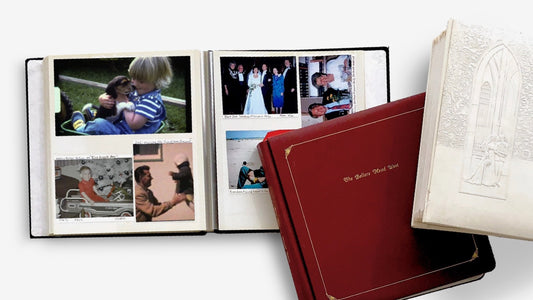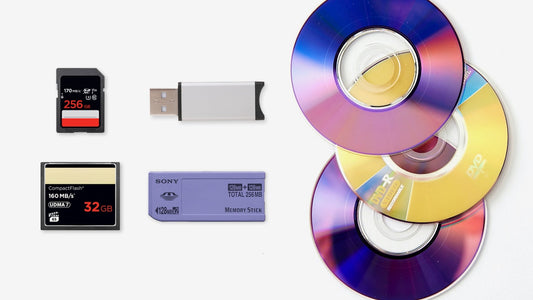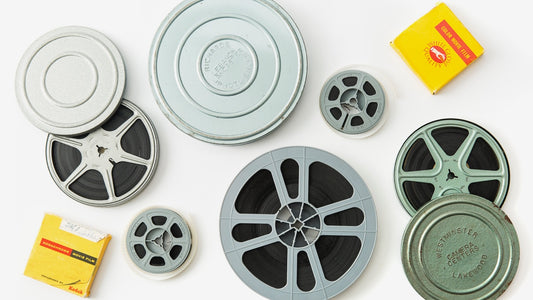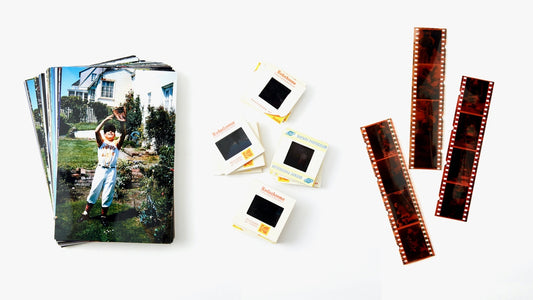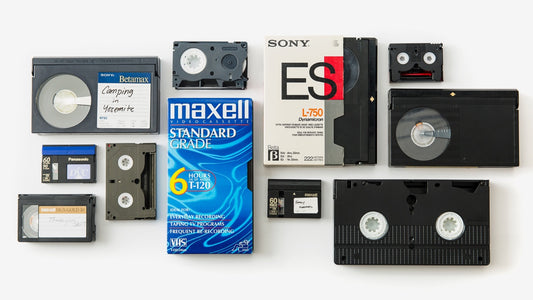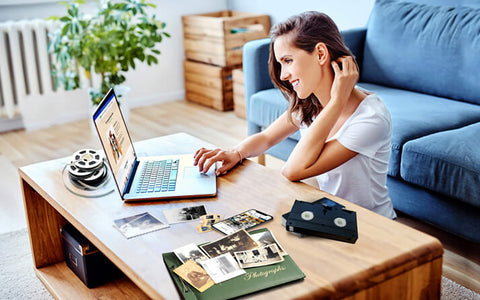Those home movies on VHS tapes aren't just gathering dust—they're slowly fading away. The magnetic tape inside weakens every year, putting your most precious memories at risk. It's time to rescue them. This guide shows you exactly how to convert VHS to DVD, safeguarding your family history for good. We'll break down the entire VHS to DVD conversion process, comparing professional services to a DIY setup. You'll get clear, actionable steps to find the right fit for your needs and finally protect those irreplaceable moments.
Key Takeaways
- Preserve family memories by converting VHS tapes to DVD or digital formats. Consider professional services like YesVideo for a hassle-free experience, especially for large collections or if you lack the time or technical skills for DIY conversion.
- Weigh the pros and cons of professional vs. DIY conversion. Professional services offer convenience, while DIY provides more control but requires equipment and technical knowledge. Evaluate your needs and budget to determine the best approach.
- Think beyond DVDs and explore digital formats like MP4 for easy sharing and storage. Digital files offer greater flexibility for accessing and enjoying your converted videos across various devices. Consider cloud storage or USB drives for backups and convenient sharing with family and friends.
Why It's Time to Convert Your VHS Tapes
Remember those bulky VHS tapes stacked in your closet? They hold precious memories, but VHS technology is outdated, and those tapes can degrade, losing picture and sound quality over time. Converting your VHS tapes to DVDs is the best way to protect those irreplaceable moments. Digitizing your videos preserves them in a format that works with today's technology, making it easier to share those memories with family and friends. Imagine easily watching a DVD or sharing digital files on your computer or tablet. You can even upload those special moments to YouTube. Converting your old tapes also saves space and declutters your home. It's a win-win—you protect your memories and simplify how you enjoy and share them. Learn more about the advantages of converting VHS tapes in this helpful guide.
Professional vs. DIY: Which Conversion Path Is for You?
Deciding how to convert your VHS tapes to DVD depends on several factors, including your budget, technical skills, and the number of tapes you need to convert. Let's weigh the pros and cons of professional services versus doing it yourself.
The Perks of a Professional Service
Professional services like YesVideo take the hassle out of VHS to DVD conversion. You simply ship your tapes, and experts manage the entire process, from capturing the footage to creating the DVDs. Services often offer various quality levels and formats, so you can choose the option that best suits your needs. Plus, with services like YesVideo, you often get access to digital storage, which lets you easily view, download, and share your converted videos online. It's a convenient way to safeguard your memories and make them accessible to family and friends. If you have a large number of tapes or lack the time or technical skills, a professional service can be a worthwhile investment.
How to Choose a Professional Conversion Service
When you start looking at different conversion services, the options can feel overwhelming. To make a confident choice, it helps to know what to look for. Key factors like experience, how they handle your tapes, turnaround time, and pricing will tell you a lot about the quality and reliability of a company. It’s about more than just getting a DVD; it’s about trusting someone with your family’s most precious moments. Let's break down what makes a great professional conversion service, so you can find the perfect partner to preserve your family's legacy.
Security of Your Memories
Handing over your one-of-a-kind home movies can feel nerve-wracking. These aren't just tapes; they're irreplaceable moments from your life. That's why the security of your memories should be a top priority when choosing a conversion service. Physical media like VHS tapes naturally degrade over time, so digitizing them is the ultimate way to protect them from fading away. A reputable company understands the sentimental value of your collection and has systems in place to track and protect your tapes from the moment they arrive until they are safely returned to you. This peace of mind is often the biggest benefit of choosing a professional service over a DIY approach.
Experience and Trust
When it comes to handling fragile, aging media, experience is non-negotiable. Look for a company that has a long history of digitizing home movies. A service with decades of experience has likely handled every type of tape format and condition imaginable. This expertise ensures they know how to properly clean, repair, and convert your videos for the best possible quality. For over 20 years, YesVideo has been trusted by millions of families to digitize their memories, which speaks volumes about their reliability and the quality of their work. A strong track record is a good indicator that your memories will be in capable hands.
In-House vs. Outsourced Processing
It’s important to ask whether a company processes your tapes in-house or outsources the work to a third party. Some companies act as middlemen, which means your precious videos get shipped to another facility, increasing the risk of them getting lost or damaged in transit. Choosing a service that handles everything under one roof provides a much higher level of security and accountability. At YesVideo, for example, every single tape is carefully processed by hand in their own US-based production facility. This ensures your memories are treated with care by a dedicated team from start to finish.
Turnaround Time
How long will it take to get your memories back? Turnaround times can vary widely, from a couple of weeks to over a month, depending on the service and the size of your order. While you’re surely eager to see your digitized videos, a rush job isn't always the best option. A realistic timeframe often indicates a company is taking the necessary care with each order. Most professional services provide an estimated completion date and offer order tracking so you can follow your memories throughout the process. Be sure to check the company’s website for their current processing times before you send your tapes.
Pricing Transparency
Cost is always a factor, but it shouldn't be the only one. Professional conversion prices can range quite a bit, so it’s important to understand what you’re paying for. Look for a service with clear, upfront pricing. Avoid companies with complicated pricing models or hidden fees, such as extra charges based on the length of your tapes. A trustworthy service will have a simple per-tape or per-item cost, like the straightforward pricing for video transfer. This transparency ensures you won’t face any surprises on your final bill and can budget accordingly for your project.
The Benefits of Going DIY
Converting VHS tapes to DVD yourself offers greater control over the process. You choose the specific equipment and software, allowing you to customize the conversion settings. This method typically involves connecting a VCR to a DVD recorder or computer with a video capture device. While DIY conversion requires more technical involvement, it can be a more budget-friendly option, especially if you only have a few tapes to convert. It also gives you the satisfaction of handling the preservation of your memories personally.
Our Top Picks for VHS to DVD Conversion Services
Ready to convert those VHS tapes to DVD? Choosing the right service or method depends on your budget, technical skills, and available time. Let's look at some popular options for VHS to DVD conversion, covering both professional services and retail options.
YesVideo
For a hands-off approach, consider a professional service like YesVideo. You simply ship your tapes, and they handle the entire conversion process. YesVideo offers various quality levels and formats, letting you choose the option that best suits your needs and budget. This full-service approach is ideal if you're short on time or prefer to leave the technical aspects to the experts. With all orders processed by hand in the USA, you can trust your precious memories are in safe hands.
iMemories
iMemories provides a convenient digital conversion experience. Their straightforward ordering process and various pricing and turnaround times make them a flexible option for different budgets and timelines. If you value ease of use and a streamlined experience, iMemories is worth exploring.
Legacybox
Legacybox is another service specializing in VHS to DVD conversion, with prices varying based on the number of tapes you need converted. They emphasize competitive pricing and US-based operations, offering customer service support throughout the process. If cost is a primary concern, comparing Legacybox's pricing with other services is a smart move.
Costco Photo Center
If you're a Costco member, their Photo Center offers VHS to DVD conversion. This can be a convenient and cost-effective option if you're already a regular Costco shopper. Check with your local Costco for pricing and availability.
Walmart Photo
If you find yourself at Walmart often, you might be interested to know they offer a service to digitize your old media. You can bring in your videotapes, film reels, photos, and slides to have them converted into modern digital files. This is a convenient way to protect your memories, since physical tapes and photos can degrade over the years. The process is simple: you place an order, send in your items, and they’ll mail everything back to you, including your new digital copies. You can choose to receive your memories as an online download, on a USB drive, or on classic DVDs, giving you plenty of options for saving your videos.
CVS Photo
CVS Photo also offers a straightforward way to bring your home movies and photos into the digital age. Their service can convert your memories to DVD, USB, Blu-ray, or a digital file you can download. This is a perfect solution for finally retiring that old VCR or projector you’ve been holding onto. One of the standout features of their service is the option to have your digital files sent directly to your Google Photos account. This makes it incredibly easy to organize, view, and share your newly digitized memories with family and friends from any device, anywhere.
Walgreens Photo
Walgreens also provides VHS to DVD conversion services in many of their photo centers. This widespread availability makes it an accessible option for many people. Like Costco, it's best to contact your local Walgreens for specific details on pricing and turnaround times.
The Walgreens Conversion Process
If you prefer using a local retail option, the Walgreens process is quite simple. Before you go, take some time to gather all the VHS tapes you want to convert. This is a perfect opportunity to sort through your collection and prioritize the home movies that mean the most to you and your family. Once you have your tapes ready, here’s what to expect:
- Visit the Photo Department: Head straight to the photo counter inside your local Walgreens. The staff there are trained to handle media transfers and can answer any questions you have about the service.
- Fill Out an Order Form: You’ll be given an order form to complete with your contact information and any specific instructions for each tape. This step ensures all your details are recorded correctly for the transfer.
- Get Notified for Pickup: After your tapes are processed, Walgreens will notify you via phone or email when your new DVDs are ready to be picked up.
This straightforward service makes it an accessible choice for preserving your family’s history, especially if you'd rather not ship your tapes or purchase special conversion equipment yourself.
What Does VHS to DVD Conversion Cost?
So, you're ready to convert those precious VHS tapes to DVD and safeguard your memories. But how much will it cost? Let's break down the expenses for both professional services and DIY conversion.
The Cost of Hiring a Pro
Going pro? Expect prices to vary based on the provider and what's included. Some services charge a flat fee per tape, while others calculate the cost by the video's length. For example, Walmart's video transfer service starts at $12.96 for the first 30 minutes, with additional costs for DVDs and USB drives. Legacybox offers a tiered pricing model, charging between $9 and $15 per tape depending on the quantity. If you have a lot of tapes, ordering in bulk can often lower the per-tape price. For longer tapes, services like YesVideo and iMemories typically charge around $40 for a two-hour VHS to DVD conversion. You can explore YesVideo's video transfer services on their website for more information.
Typical Price Ranges
When you start looking into professional conversion services, you'll find that prices can really differ. Generally, the average cost to convert a single VHS tape professionally falls somewhere between $7.50 and $35. Some services, like Walmart, price by the minute, starting around $13 for the first half-hour of footage. Others, like Legacybox, use a tiered system where the per-tape price drops as you add more tapes to your order, often landing between $9 and $15 each. Keep in mind that the final cost will also depend on factors like the length of your videos and whether you want extra DVDs or a digital download, so it’s smart to get a complete quote before you commit.
Common Pricing Models
As you explore different options, you'll see a few main ways companies structure their pricing. The most straightforward is a flat rate per tape, which makes it simple to figure out your total cost. If you have a large collection of home movies, keep an eye out for services that offer bulk pricing—the more tapes you send in, the less you pay for each one. Another common model is pricing based on the length of the video footage. For example, a standard two-hour tape might cost around $40 for a complete video transfer. Knowing these different models helps you compare apples to apples and find the best deal for your project.
Budgeting for Your DIY Project
Converting VHS tapes to DVD yourself might seem like a budget-friendly option, but the initial investment in equipment can be significant. You'll need a VCR (if you don't already have one), a DVD recorder, and potentially a video capture device. These combined costs can range from $250 to upwards of $600, depending on the quality of the equipment. While the DIY route offers unlimited conversions after the initial investment, finding functional, quality equipment can be a challenge. Plus, consider the value of your time. The process involves connecting equipment, adjusting settings, capturing the video, and burning the DVD, which can be quite time-consuming.
What Equipment Do You Need to Convert VHS to DVD?
Want to take the DIY route? Here’s a rundown of the equipment you'll need to convert VHS tapes to DVDs yourself. Getting set up might sound intimidating, but with a little guidance, you can absolutely tackle this project at home.
Understanding the DIY Market
If you're the type who loves a good project, converting your VHS tapes to DVD yourself can be incredibly rewarding. Going the DIY route puts you in the driver's seat, giving you full control over the equipment and the final quality of your videos. This path is perfect if you enjoy working with technology and want to personally handle the preservation of your family’s memories. It can also be a smart choice for your wallet, especially if you only have a few tapes. While it definitely takes more time and effort than using a professional service, there's a special satisfaction in knowing you saved those moments yourself.
Popular Conversion Tools
To kick off your DIY conversion, you'll need some essential equipment. The standard setup involves connecting a VCR to a DVD recorder or a computer that has a video capture device. Be prepared for an initial investment, as the necessary gear can cost anywhere from $250 to over $600, depending on the quality you choose. The upside is that once you have everything, you can convert as many tapes as you want. As you start to gather your equipment, you'll be looking for these key items:
- VCR: You'll need a working VCR to play your old tapes. Make sure it’s in good condition to avoid damaging your precious memories.
- DVD Recorder: This device records the video signal from your VCR directly onto a blank DVD.
- Video Capture Device: If you’re using a computer, this small device connects your VCR to your PC or Mac, allowing you to capture the video and audio digitally.
VCR/DVD Combo Players
One of the easiest ways to convert your VHS tapes to DVDs is using a VCR/DVD combo unit. These handy devices combine both a VCR and DVD player/recorder in one, allowing for a straightforward transfer process. You can often find these units on secondhand marketplaces like eBay or Facebook Marketplace, often at reasonable prices. A VCR/DVD combo unit lets you directly copy your VHS tapes to blank DVDs without needing any extra equipment or software. This plug-and-play approach is perfect for those who want a simple, no-fuss solution. Just pop in your tape, a blank DVD, and hit record.
A Note on Refurbished Equipment
Since new VCRs are no longer being made, refurbished equipment is your best bet for a DIY conversion project. Opting for a refurbished VCR/DVD combo unit can be a smart, cost-effective move. These are pre-owned devices that have been professionally inspected, repaired, and certified to work like new, and they often come with a warranty for extra peace of mind. This approach not only saves you money but also gives old electronics a new life, which is a nice bonus for the environment. The key is to purchase from a reputable source. When browsing online marketplaces, look for sellers with high ratings and clear return policies, and be sure to read the fine print on what "refurbished" actually means for that specific item to avoid any surprises.
Video Capture Devices
If you're looking for more control over the conversion process, a video capture device is the way to go. These devices, like the Roxio Easy VHS to DVD 3 Plus, connect your VCR to your computer. This setup allows you to capture the video footage digitally, giving you the flexibility to edit it using video editing software before burning it to a DVD. You can also save the digital files to your computer or a cloud storage service for safekeeping. This method offers greater control over video quality and allows you to make adjustments, add transitions, or even create chapters. You can find video capture devices at most electronics retailers or online.
Conversion Software Options
Once you've connected your VCR to your computer with a video capture device, you'll need video editing software to manage the capturing and editing process. There are many options available, ranging from free basic software to more advanced paid programs. The software you choose will depend on your technical skills and the level of editing you want to do. Basic software will allow you to capture the video and burn it to a DVD, while more advanced options offer features like video stabilization, color correction, and audio enhancement. Choosing the right software is key for a smooth conversion process and a high-quality final product. You can find recommendations for video editing software with a quick online search, or check out resources like PCMag's reviews to compare features and pricing.
How to Convert VHS to DVD: A Step-by-Step Guide
This section provides a general overview of the DIY conversion process. If you’d prefer a hassle-free experience and guaranteed quality, consider YesVideo's professional video transfer services.
Step 1: Prep Your VHS Tapes
First, clean your VHS tapes. Dust and debris can reduce video quality during the transfer process. Wipe the outer case with a mild soap solution and a soft cloth. For stubborn grime, use a specialized VHS head cleaner to maintain your VCR and ensure smoother playback.
Step 2: Set Up Your Equipment
Gather your equipment: a VCR, a DVD recorder, a video capture device, and a computer. Connect your VCR to the video capture device, and then connect the capture device to your computer. Install the necessary software that came with your video capture device. Also, connect your DVD recorder to your computer.
Step 3: Capture and Edit the Video
Once your equipment is connected, insert your VHS tape into the VCR and a blank DVD into the DVD recorder. Start playing the VHS tape and simultaneously begin capturing the video using your software. Monitor the process on your computer to ensure a smooth, uninterrupted recording. After capturing the video, use the software for basic edits, like trimming the beginning or end.
Step 4: Burn to DVD
After capturing and editing, use your software to burn the video onto the DVD. This creates a physical copy of your VHS content. Transferring your VHS tapes to DVDs preserves your memories in a format that's playable on most DVD players, and you can easily transfer the DVD content to your computer for additional editing and sharing.
Getting the Best Quality from Your VHS Tapes
Getting the best possible quality when you convert VHS tapes to DVD involves a few key steps. Whether you're doing it yourself or using a professional service like YesVideo, these tips will help preserve your precious memories.
Clean and Care for Your Tapes
Before converting your tapes, clean the outer case with a mild soap solution and a soft cloth. This removes dirt and grime that could affect the playback and conversion process. Avoid harsh chemicals or abrasive materials that might damage the case or the tape inside. If you have a VHS Rewinder, gently rewind and fast-forward the tape to tighten any loose portions and further improve playback quality. You can find more tips on cleaning and maintaining VHS tapes online.
Optimize Your Capture Settings
If you're converting VHS tapes yourself, the capture settings on your equipment significantly impact the final DVD quality. Using a high-quality video capture device is essential. Some devices produce blurry images or visual artifacts, so research and select the right equipment for your needs. Explore different settings on your capture device to find the optimal balance between video quality and file size. Experiment with different resolutions and bitrates to see what looks best with your setup. Articles on common VHS to digital conversion problems often offer solutions for optimizing these settings.
Tips for Enhancing Video Quality
Once you've converted your VHS tapes to digital files, you can enhance the video quality further. Basic video editing software often includes tools to adjust brightness, contrast, color saturation, and sharpness. You can also reduce noise and stabilize shaky footage. If you're not comfortable with video editing or want the best possible results, consider a professional VHS to DVD converter service. Professional services have specialized equipment and expertise to ensure a high-quality transfer and can often enhance the video during the conversion process, addressing issues like color correction and audio restoration.
VHS to DVD Conversion Mistakes (and How to Avoid Them)
Transferring your treasured memories from VHS to DVD is a smart move, but a few common missteps can trip you up. Avoid these pitfalls to ensure your home movies look their best in their new digital format.
Ignoring De-interlacing
De-interlacing is essential for converting VHS tapes (which use interlaced video) into a format compatible with modern screens (which use progressive video). Think of it like weaving two images together to create a single frame. If the de-interlacing process isn't handled well, you might see jagged edges or a slight shimmer on your converted videos. A quality video capture device and software often handle this automatically, but it's worth double-checking the settings to ensure optimal results.
Using a Low-Quality Capture Device
Investing in a decent video capture device is key for a successful transfer. While budget-friendly options exist, skimping on quality here can really impact your final product. A low-quality capture card might introduce visual noise, blurriness, or other distortions that weren't present on the original VHS tape. Subpar equipment can cause problems ranging from minor annoyances to significant quality degradation. Do your research and choose a capture device that balances your budget with your desire for crisp, clear video.
An Improper Equipment Setup
Beyond the capture device itself, the entire setup matters. Everything from the VHS player you use to the cables connecting your equipment can affect the transfer quality. A worn-out VHS player might introduce tracking issues or other playback problems that will carry over to the digital copy. Even small issues with your VHS tapes can become magnified during the transfer process, so ensure your equipment is in good working order and correctly connected.
Forgetting to Finalize Your DVD
This seemingly small step is crucial. After transferring your video to DVD, you need to "finalize" the disc. This process tells the DVD player that no more data will be added, making it playable on most standard DVD players. Skipping this step can lead to frustrating compatibility issues, where your DVD might play on your computer but not on your living room DVD player. Make sure you understand the process of finalizing DVDs for the best results.
How to Preserve and Organize Your New DVDs
Once you’ve converted your VHS tapes to DVDs, preserving and organizing them properly is crucial for long-term access to those precious memories. Here’s how to keep your newly digitized videos safe and sound:
The Right Way to Store Your DVDs
Think of your converted DVDs like any other treasured keepsake. You want to protect them from the elements, just like you would photo albums or important documents. Store your DVDs in a cool, dry place away from direct sunlight. Heat and UV rays can damage the discs over time, so avoid spots like attics, basements prone to dampness, or windowsills. Excessive heat can warp the DVD, making it unplayable, and sunlight can fade the data layer, leading to data loss.
Also, avoid stacking DVDs on top of each other. This might seem space-saving, but it can lead to scratches and other physical damage. Instead, use protective cases for each DVD. You can find cases made from archival-quality materials that offer even greater protection against dust and scratches. These archival-quality cases are designed to be chemically inert, meaning they won't interact with the DVD material and cause degradation over time.
Labeling and Cataloging Your Collection
Labeling might seem like a small step, but it’s incredibly helpful for staying organized. Clearly label each DVD with its contents, including the date of the conversion and any details about the original VHS tape. Was it a family vacation? Your child’s first birthday party? Jotting down these details directly on the DVD case will make it much easier to find specific memories later on. You can use a permanent marker directly on the case or create labels on your computer for a cleaner look.
Beyond individual labels, consider creating a catalog or inventory list of all your converted DVDs. This could be a simple spreadsheet or even a handwritten list. Include information like the title, date of the original recording, date of conversion, and any special notes about the content. Creating a catalog not only helps you keep track of your collection but also provides a valuable record in case of loss or damage. Think of it as a roadmap to your memories!
Beyond DVDs: Other Ways to Digitize Your Tapes
While DVDs offer a tangible way to enjoy your converted VHS tapes, digital formats open a world of possibilities. Think beyond just DVDs—digital files are easier to store, edit, and share with family and friends, no matter where they are. Plus, you’re not limited by the constraints of a physical disc. Let’s explore some popular digital formats and why they might be right for you.
Converting your old tapes to digital formats like MP4 offers incredible flexibility. MP4 files are widely compatible with almost any device—computers, smartphones, tablets, and even smart TVs. This makes sharing simple, whether you're emailing a funny clip to your sister or uploading family videos to a private YouTube channel. Services like YesVideo offer digital downloads, simplifying the process.
Another advantage of digital files is the ease of creating backups. External hard drives and cloud storage services offer secure and convenient ways to protect your memories from loss or damage. You can even store copies in multiple locations for extra peace of mind. This is a huge advantage over physical media, which can degrade over time or be easily misplaced. YesVideo understands this and offers digital transfer services, including USB drives, for easy access and sharing.
Finally, digital formats make it simple to edit and enhance your videos. You can trim unwanted footage, stabilize shaky shots, and even add music or captions. Free and paid video editing software is readily available, giving you the tools to create polished home movies. If you're looking for a streamlined way to preserve and share your memories, consider the benefits of digital formats alongside, or instead of, DVDs. Explore YesVideo's options to see how they can help bring your VHS tapes into the digital age.
Related Articles
- VHS to DVD: Top Transfer Services & DIY Guide – YesVideo
- Best VHS Video to Digital Converters: Top Picks – YesVideo
- VHS to DVD Converter: 2023 Guide + Top Picks – YesVideo
- Convert VHS to Digital: The Ultimate 2024 Guide – YesVideo
- VHS Converter Guide: Digitize Your Tapes with Ease – YesVideo
Frequently Asked Questions
Why shouldn't I just keep my VHS tapes?
VHS tapes degrade over time, losing picture and sound quality. Converting them to a digital format like DVD or MP4 ensures your memories are preserved and easily accessible for years to come. Plus, digital formats are much easier to share with family and friends.
What's the main difference between professional conversion services and DIY?
Professional services like YesVideo handle the entire process for you, from shipping to digitization. DIY conversion requires you to purchase and operate the equipment yourself, which can be more time-consuming and technically challenging.
Which professional conversion service is best?
The "best" service depends on your specific needs and budget. YesVideo offers a range of options and quality levels, while other services like iMemories and Legacybox may be more suitable for specific budgets or project sizes. Researching each service and comparing pricing and features is recommended.
What equipment do I need for DIY conversion, and where can I find it?
You'll need a VCR, a DVD recorder or a video capture device, and a computer with video editing software. You can often find VCR/DVD combo units secondhand, while video capture devices are available at most electronics retailers.
What are the biggest mistakes to avoid when converting VHS to DVD?
Common mistakes include using low-quality equipment, neglecting to finalize the DVD, improper de-interlacing, and poor equipment setup. These can lead to quality issues or compatibility problems with your converted videos. Careful planning and attention to detail are essential for a successful conversion.





